

Kids Helpline - Respectful Relationships. What is respect?
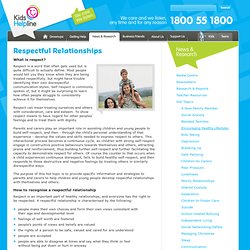
Respect is a word that often gets used but is quite difficult to actually define. Most people would tell you they know when they are being treated respectfully, but might have trouble identifying their own disrespectful communication styles. Self-respect is commonly spoken of, but it might be surprising to learn how often people struggle to consistently achieve it for themselves. Respect can mean treating ourselves and others with consideration, care and esteem. To show respect means to have regard for other peoples' feelings and to treat them with dignity.
Growing together in relationships. This material is also available in a PDF format: Growing together in relationships [4.6MB] Early childhood is when children begin developing their social and emotional skills, which influence children’s mental health and wellbeing,now and in the future.
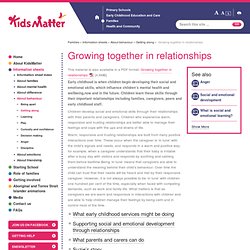
Children learn these skills through their important relationships including families, caregivers, peers and early childhood staff. Children develop social and emotional skills through their relationships with their parents and caregivers. Children who experience warm, responsive and trusting relationships are better able to manage their feelings and cope with the ups and downs of life. Warm, responsive and trusting relationships are built from many positive interactions over time.
What early childhood services might be doing(content changes below) Staff in early childhood services will be using many of the same strategies to develop positive relationships with children and foster the development of their social and emotional skills. Child development and relationships. Why loving, nurturing relationships are important Children’s relationships shape the way they see the world and affect all areas of their development.
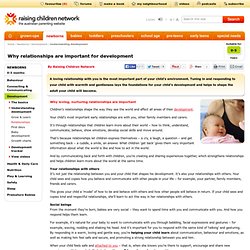
Your child’s most important early relationships are with you, other family members and carers. It’s through relationships that children learn more about their world – how to think, understand, communicate, behave, show emotions, develop social skills and move around. That’s because relationships let children express themselves – a cry, a laugh, a question – and get something back – a cuddle, a smile, an answer. What children ‘get back’ gives them very important information about what the world is like and how to act in the world. Growing Respect. High School 12-13 years old.
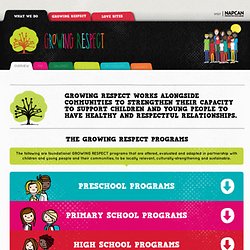
Year 7 Young people will understand the challenges of the transition to High School, to define how power and control are used, to define bullying behaviour and it’s impact, define what an active and passive bystander are. ISSUES COVERED Transition to high school, power & control, bullying, bystander strategies, homophobia, community attitudes & beliefs, violence and sexual assault. 7 lesson plans and activities (1 hour duration each) 13-14 years old. Www.whealth.com.au/documents/work/trauma/SelfPaced_Applying-Practice-Principle-5.pdf. Relationships with children. Kids Helpline - Respectful Relationships. What is respect?
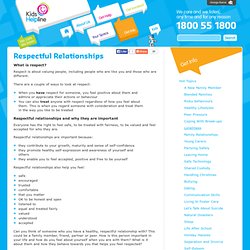
Respect is about valuing people, including people who are like you and those who are different. There are a couple of ways to look at respect: When you have respect for someone, you feel positive about them and admire or appreciate their actions or behaviour You can also treat anyone with respect regardless of how you feel about them. This is when you regard someone with consideration and treat them in the way you like to be treated Respectful relationships and why they are important Everyone has the right to feel safe, to be treated with fairness, to be valued and feel accepted for who they are. Respectful relationships are important because: they contribute to your growth, maturity and sense of self-confidence they promote healthy self-expression and awareness of yourself and others they enable you to feel accepted, positive and free to be yourself Respectful relationships also help you feel: Can you think of someone who you have a healthy, respectful relationship with?
Quality Area 5: Relationships with children. « Back | Next » | Guide 3 PDF Quality Area 5: Standards and elements Quality Area 5: Related sections of the National Law and National Regulations Introduction Experiencing ‘belonging’—knowing where and with whom you belong—is integral to human existence.
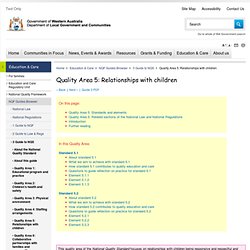
In early childhood, in middle childhood and throughout life, relationships are crucial to a sense of belonging (Early Years Learning Framework, page 7; Framework for School Age Care, page 5). Training.gov.au - CHCECE007 - Develop positive and respectful relationships with children. CHCECE007 - Develop positive and respectful relationships with children (Release 1) Summary Releases: Usage recommendation: Current Training packages that include this unit Qualifications that include this unit The content being displayed has been produced by a third party, while all attempts have been made to make this content as accessible as possible it cannot be guaranteed.
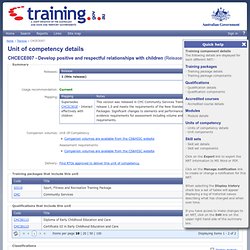
Modification History Application. Www.earlychildhoodaustralia.org.au/nqsplp/wp-content/uploads/2012/06/NQS_PLP_E-Newsletter_No36.pdf. Www.cscentral.org.au/Resources/Publications/respectful-relationships.pdf.